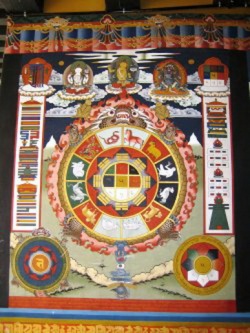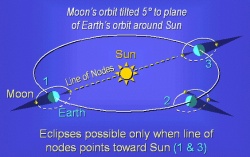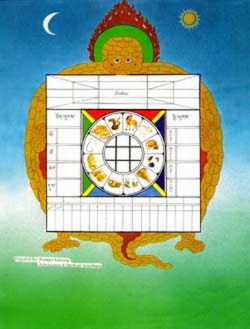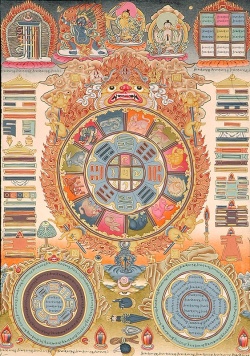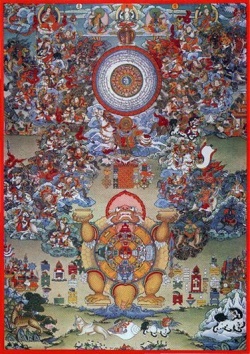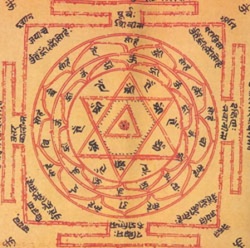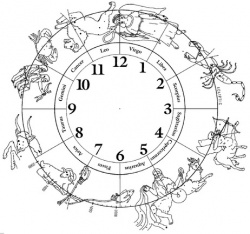Astrology
Astrology (jotisattha or nakkhattavijjā) is the belief that the position of the planets and the stars in relation to each other has a significant influence on human character and Destiny.
This belief contradicts the most Basic Buddhist Doctrine that our character and Destiny are the result of the sum total of our intentional thoughts, speech and actions, i.e. our Kamma.
The Buddha said Monks and nuns must not practise astrology or any other Form of Fortune-telling, all of which he called ‘base arts’ (tiracchānavijjā,D.I,8).
In the Jātaka he tells a story which highlights the foolishness of relying on astrological predictions (Ja.I,258).
Logically, all astrological calculations up to 1930 must have been incorrect, because they did not allow for the planet Pluto, which was only discovered in that year, and all calculations since 1930 must have also been incorrect because they did not account for the new planet discovered in 2005.
Ironically, many people in Buddhist countries believe in astrology and Monks commonly do astrological predictions.
Astrology consists of belief systems which hold that there is a relationship between astronomical phenomena and events in the human world.
In the West, astrology most often consists of a system of horoscopes that claim to explain aspects of a person's personality and predict future events in their life based on the positions of the sun, moon, and other planetary objects at the time of their birth.
Many cultures have attached importance to astronomical events, and the Indians, Chinese, and Mayans developed elaborate systems for predicting terrestrial events from celestial observations.
Astrology (horà÷àstra) is the belief that the position of the planets and the stars in relation to each other has a significant influence on human character and destiny.
This belief contradicts the most basic Buddhist doctrine that our character and destiny are the result of the sum total of our intentional thoughts, speech and actions, i.e. our kamma.
The Buddha said monks and nuns must not practice astrology or any other form of fortune-telling, all of which he called ‘base arts’ (Digha Nikaya 1. 8). In the Jataka he tells a story which highlights the foolishness of relying on astrological predictions (Jataka 1. 258).
Logically, all astrological calculations up to 1930 must have been incorrect because they did not allow for the planet Pluto, which was only discovered in that year, and all calculations since 1930 must have also been incorrect because they did not account for the new planet discovered in 2005. Many people in Buddhist countries believe in astrology and monks commonly do astrological predictions.
Among Indo-European peoples, astrology has been dated to the 3rd millennium BCE, with roots in calendrical systems used to predict seasonal shifts and to interpret celestial cycles as signs of divine communications.
Through most of its history, astrology was considered a scholarly tradition.
It was accepted in political and academic contexts, and was connected with other studies, such as astronomy, alchemy, meteorology, and medicine.
At the end of the 17th century, new scientific concepts in astronomy and physics (such as heliocentrism and Newtonian mechanics) called astrology into question, and subsequent controlled studies failed to confirm its predictive value.
Astrology thus lost its academic and theoretical standing, and common belief in astrology has largely declined.
Astrology has been rejected by the scientific community as having no explanatory power for describing the universe.
Scientific testing of astrology has been conducted, and no evidence has been found to support any of the premises or purported effects outlined in astrological traditions.
Where astrology has made falsifiable predictions, it has been falsified. :424
There is no proposed mechanism of action by which the positions and motions of stars and planets could affect people and events on Earth that does not contradict well understood, basic aspects of biology and physics.
Etymology
The word astrology comes from the early Latin word astrologia, deriving from the Greek noun ἀστρολογία, 'account of the stars'.
Astrologia later passed into meaning 'star-divination' with astronomy used for the scientific term.
Principles and practice
Advocates have defined astrology as a symbolic language, an art form, a science, and a method of divination.
Although most cultural systems of astrology share common roots in ancient philosophies that influenced each other, many have unique methodologies which differ from those developed in the West.
These include Hindu astrology (also known as "Indian astrology" and in modern times referred to as "Vedic astrology") and Chinese astrology, both of which have influenced the world's cultural history.
Western
Western astrology is a form of divination based on the construction of a horoscope for an exact moment, such as a person's birth. It uses the tropical zodiac, which is aligned to the equinoctial points.
Western astrology is founded on the movements and relative positions of celestial bodies such as the Sun, Moon, planets, which are analyzed by their movement through signs of the zodiac (spatial divisions of the ecliptic) and by their aspects (angles) relative to one another.
They are also considered by their placement in houses (spatial divisions of the sky).
Astrology's modern representation in western popular media is usually reduced to sun sign astrology, which considers only the zodiac sign of the Sun at an individual's date of birth, and represents only 1/12 of the total chart.
The names of the zodiac correspond to the names of the constellations originally within the respective segment and are in Latin.
Along with tarot divination, astrology is one of the core studies of Western esotericism, and as such has influenced systems of magical belief not only among Western esotericists and Hermeticists, but also belief systems such as Wicca that have borrowed from or been influenced by the Western esoteric tradition.
Tanya Luhrmann has said that "all magicians know something about astrology," and refers to a table of correspondences in Starhawk's The Spiral Dance, organized by planet, as an example of the astrological lore studied by magicians.
Indian and South Asian
Hindu astrology originated with western astrology. :361 In the earliest Indian astronomy texts, the year was believed to be 360 days long, similar to that of Babylonian astrology, but the rest of the early astrological system bears little resemblance. :229 Later, the Indian techniques were augmented with some of the Babylonian techniques. :231
Chinese and East-Asian
Chinese astrology has a close relation with Chinese philosophy (theory of the three harmonies:
heaven,
earth and man)
and uses concepts such as yin and yang,
the Five phases,
the 10 Celestial stems,
the 12 Earthly Branches, and
shichen (時辰 a form of timekeeping used for religious purposes).
The early use of Chinese astrology was mainly confined to political astrology, the observation of unusual phenomena, identification of portents and the selection of auspicious days for events and decisions.
The constellations of the Zodiac of western Asia and Europe were not used; instead the sky is divided into Three Enclosures (三垣 sān yuán), and Twenty-eight Mansions (二十八宿 èrshíbā xiù) in twelve Ci (十二次).
The Chinese zodiac of twelve animal signs is said to represent twelve different types of personality.
It is based on cycles of years, lunar months, and two-hour periods of the day (the shichen).
The zodiac traditionally begins with the sign of the Rat, and the cycle proceeds through 11 other animals signs:
the Ox,
Tiger,
Rabbit,
Dragon,
Snake,
Horse,
Goat,
Monkey,
Rooster,
Dog and
Pig.
Complex systems of predicting fate and destiny based on one's birthday, birth season, and birth hours, such as ziping and Zi Wei Dou Shu (simplified Chinese: 紫微斗数; traditional Chinese: 紫微斗數; pinyin: zǐwēidǒushù) are still used regularly in modern day Chinese astrology. They do not rely on direct observations of the stars.
The Korean zodiac is identical to the Chinese one. The Vietnamese zodiac is almost identical to Chinese zodiac except the second animal is the Water Buffalo instead of the Ox, and the fourth animal is the Cat instead of the Rabbit.
The Japanese zodiac includes the Wild Boar instead of the Pig, and the Japanese have since 1873 celebrated the beginning of the new year on the 1st of January as per the Gregorian Calendar.
The Thai zodiac includes a Naga in place of the Dragon and begins, not at Chinese New Year, but either on the first day of fifth month in the Thai lunar calendar, or during the Songkran festival (now celebrated every 13–15 April), depending on the purpose of the use.
History
Astrology, in its broadest sense, is the search for meaning in the sky. It has therefore been argued that astrology began as a study as soon as human beings made conscious attempts to measure, record, and predict seasonal changes by reference to astronomical cycles.
Early evidence of such practices appears as markings on bones and cave walls, which show that lunar cycles were being noted as early as 25,000 years ago; the first step towards recording the Moon’s influence upon tides and rivers, and towards organizing a communal calendar.
Agricultural needs were also met by increasing knowledge of constellations, whose appearances change with the seasons, allowing the rising of particular star-groups to herald annual floods or seasonal activities.
By the 3rd millennium BCE, widespread civilizations had developed sophisticated awareness of celestial cycles, and are believed to have consciously oriented their temples to create alignment with the heliacal risings of the stars.
There is scattered evidence to suggest that the oldest known astrological references are copies of texts made during this period.
Two, from the Venus tablet of Ammisaduqa (compiled in Babylon around 1700 BCE) are reported to have been made during the reign of king Sargon of Akkad (2334–2279 BCE).
Another, showing an early use of electional astrology, is ascribed to the reign of the Sumerian ruler Gudea of Lagash (c. 2144 – 2124 BCE).
This describes how the gods revealed to him in a dream the constellations that would be most favorable for the planned construction of a temple .
However, there is controversy about whether they were genuinely recorded at the time or merely ascribed to ancient rulers by posterity.
The oldest undisputed evidence of the use of astrology as an integrated system of knowledge is therefore attributed to the records of the first dynasty of Mesopotamia (1950–1651 BCE).
The system of Chinese astrology was elaborated during the Zhou dynasty (1046–256 BCE) and flourished during the Han Dynasty (2nd century BCE to 2nd century CE), during which all the familiar elements of traditional Chinese culture – the Yin-Yang philosophy,
theory of the five elements,
Heaven and Earth,
Confucian morality – were brought together to formalise the philosophical principles of Chinese medicine and divination,
astrology and
alchemy.
Medieval Islamic world
Astrology was taken up by Islamic scholars following the collapse of Alexandria to the Arabs in the 7th century, and the founding of the Abbasid empire in the 8th.
The second Abbasid caliph, Al Mansur (754–775) founded the city of Baghdad to act as a centre of learning, and included in its design a library-translation centre known as Bayt al-Hikma ‘Storehouse of Wisdom’, which continued to receive development from his heirs and was to provide a major impetus for Arabic-Persian translations of Hellenistic astrological texts. The early translators included Mashallah,
who helped to elect the time for the foundation of Baghdad, and Sahl ibn Bishr, (a.k.a. Zael), whose texts were directly influential upon later European astrologers such as Guido Bonatti in the 13th century, and William Lilly in the 17th century.
Knowledge of Arabic texts started to become imported into Europe during the Latin translations of the 12th century, the effect of which was to help initiate the European Renaissance.
Early Modern
By the 17th century, in England, astrology had reached its zenith. Astrologers were theorists, researchers, and social engineers, as well as providing individual advice to everyone from monarchs downwards.
Among other things, astrologers could advise on the best time to take a journey or harvest a crop, diagnose and prescribe for physical or mental illnesses, and predict natural disasters.
This underpinned a system in which everything - people, the world, the universe - was understood to be interconnected, and astrology co-existed happily with religion, magic and science.
Since 1900
Astrology saw a popular revival starting in the 19th century as part of a general revival of spiritualism and later New Age philosophy , and through the influence of mass media such as newspaper horoscopes and astrology software.
Early in the 20th century psychologist Carl Jung developed some concepts concerning astrology, which led to the development of psychological astrology.
In the West there have been occasional reports of political leaders consulting astrologers. Louis de Wohl worked as an astrologer for the British intelligence agency MI5, after it was claimed that Hitler used astrology to time his actions.
The War Office was "interested to know what Hitler's own astrologers would be telling him from week to week".
In fact de Wohl's predictions were so inaccurate that he was soon labelled a "complete charlatan" and it was later shown that Hitler considered astrology to be "complete nonsense".
After John Hinckley's attempted assassination of U.S. President Ronald Reagan, first lady Nancy Reagan commissioned astrologer Joan Quigley to act as the secret White House astrologer.
However, Quigley's role ended in 1988 when it became public through the memoirs of former chief of staff, Donald Regan.
Birth (in blue) and death (in red) rates of Japan since 1950, with the sudden drop in births during hinoeuma year (1966)
In India, there is a long-established and widespread belief in astrology.
It is commonly used for daily life, particularly in matters concerning marriage and career, and makes extensive use of electional, horary and karmic astrology. Indian politics has also been influenced by astrology.
It remains considered a branch of the Vedanga.
In 2001, Indian scientists and politicians debated and critiqued a proposal to use state money to fund research into astrology, resulting in permission for Indian universities to offer courses in Vedicastrology.
In February 2011, the Bombay High Court reaffirmed astrology's standing in India when it dismissed a case which had challenged its status as a science.
In Japan, a strong belief in astrology has led to dramatic changes in the fertility rate and the number of abortions in the years of "Fire Horse".
Women born in hinoeuma years are believed to be unmarriageable and to bring bad luck to their father or husband.
In 1966, the number of babies born in Japan dropped by over 25% as parents tried to avoid the stigma of having a daughter born in the hinoeuma year.
Scientific appraisal
Astrology has not demonstrated its effectiveness in controlled studies and has no scientific validity, and as such, is regarded as pseudoscience .
The majority of professional astrologers rely on performing astrology-based personality tests and making relevant predictions about the remunerator's future.
Those who continue to have faith in astrology have been characterized as doing so "in spite of the fact that there is no verified scientific basis for their beliefs, and indeed that there is strong evidence to the contrary".
Astrophysicist Neil de Grasse Tyson commented on astrological belief, saying that "part of knowing how to think is knowing how the laws of nature shape the world around us.
Without that knowledge, without that capacity to think, you can easily become a victim of people who seek to take advantage of you".
The former astrologer, and scientist, Geoffrey Dean and psychologist Ivan Kelly conducted a large scale scientific test, involving more than one hundred cognitive, behavioral, physical and other variables, but found no support for astrology.
Furthermore, a meta-analysis was conducted pooling 40 studies consisting of 700 astrologers and over 1,000 birth charts.
Ten of the tests, which had a total of 300 participants, involved subjects picking the correct chart interpretation out of a number of others which were not the astrologically correct chart interpretation (usually 3 to 5 others).
When the date and other obvious clues were removed no significant results were found to suggest there was any preferred chart.
A further test involved 45 confident[a] astrologers, with an average of 10 years experience and 160 participants (out of an original sample size of 1198 participants) who strongly favored certain characteristics in the Eysenck Personality Questionnaire to extremes.
The astrologers performed much worse than merely basing decisions off the individuals age, and much worse than 45 control subjects who did not use birth charts at all.
Science and non-science are often distinguished by the criterion of falsifiability. The criterion was first proposed by philosopher of science Karl Popper.
To Popper, science does not rely on induction; instead, scientific investigations are inherently attempts to falsify existing theories through novel tests.
If a single test fails, then the theory is falsified.
Therefore, any test of a scientific theory must prohibit certain results which will falsify the theory, and expect other specific results which will be consistent with the theory.
Using this criterion of falsifiability, astrology is a pseudoscience.
Popper regarded astrology as "pseudo-empirical" in that "it appeals to observation and experiment", but "nevertheless does not come up to scientific standards".
In 1953, sociologist Theodor W. Adorno conducted a study of the astrology column of a Los Angeles newspaper as part of a project examining mass culture in capitalist society.
Adorno concluded that astrology was a large-scale manifestation of systematic irrationalism, where individuals were subtly being led to believe that the author of the column was addressing them directly through the use of flattery and vague generalizations.
Theological viewpoints
Some of the practices of astrology were contested on theological grounds by medieval Muslim astronomers such as Al-Farabi (Alpharabius), Ibn al-Haytham (Alhazen) and Avicenna.
They said that the methods of astrologers conflicted with orthodox religious views of Islamic scholars through the suggestion that the Will of God can be known and predicted in advance.
For example, Avicenna’s 'Refutation against astrology' Risāla fī ibṭāl aḥkām al-nojūm, argues against the practice of astrology while supporting the principle of planets acting as the agents of divine causation which express God's absolute power over creation.
Avicenna considered that the movement of the planets influenced life on earth in a deterministic way, but argued against the capability of determining the exact influence of the stars.
In essence, Avicenna did not refute the essential dogma of astrology, but denied our ability to understand it to the extent that precise and fatalistic predictions could be made from it.
Ibn Qayyim Al-Jawziyya (1292–1350), in his Miftah Dar al-SaCadah, also used physical arguments in astronomy to question the practice of judicial astrology. He recognized that the stars are much larger than the planets, and argued:
And if you astrologers answer that it is precisely because of this distance and smallness that their influences are negligible, then why is it that you claim a great influence for the smallest heavenly body, Mercury?
Why is it that you have given an influence to al-Ra's and al-Dhanab, which are two imaginary points [ascending and descending nodes) —Ibn Qayyim Al-Jawziyya
Belief in astrology is incompatible with Catholic beliefs such as free will. According to the Catechism of the Catholic Church:
All forms of divination are to be rejected: recourse to Satan or demons, conjuring up the dead or other practices falsely supposed to "unveil" the future.
Consulting horoscopes, astrology, palm reading, interpretation of omens and lots, the phenomena of clairvoyance, and recourse to mediums all conceal a desire for power over time, history, and, in the last analysis, other human beings, as well as a wish to conciliate hidden powers.
They contradict the honor, respect, and loving fear that we owe to God alone.
—Catechism of the Catholic Church
St. Augustine believed that astrology conflicted with church doctrine, but he grounded his opposition with non-theological reasons such as the failure of astrology to explain twins who behave differently although are conceived at the same moment and born at approximately the same time.
